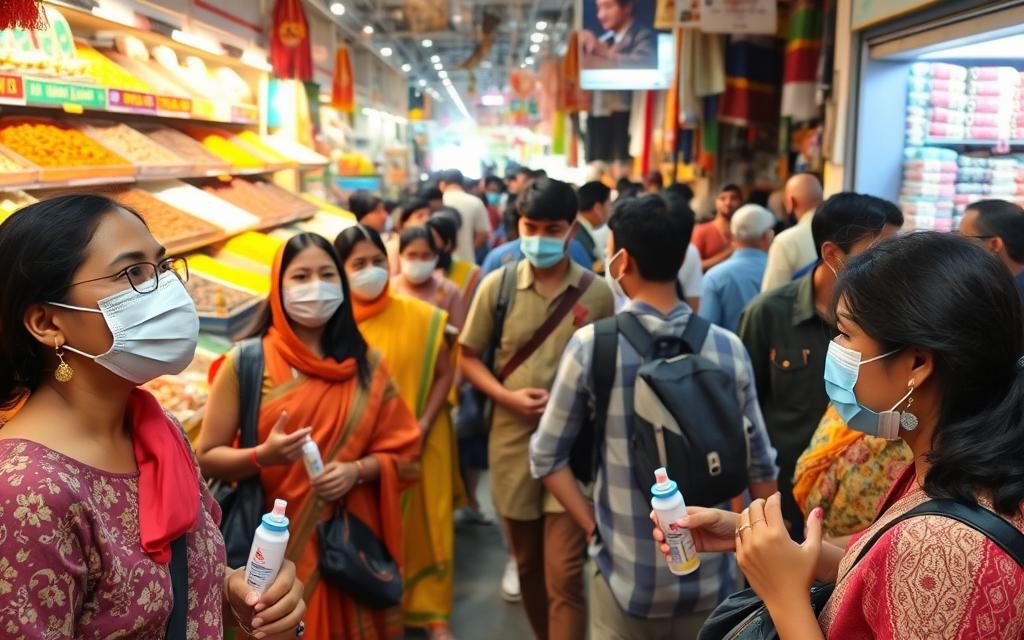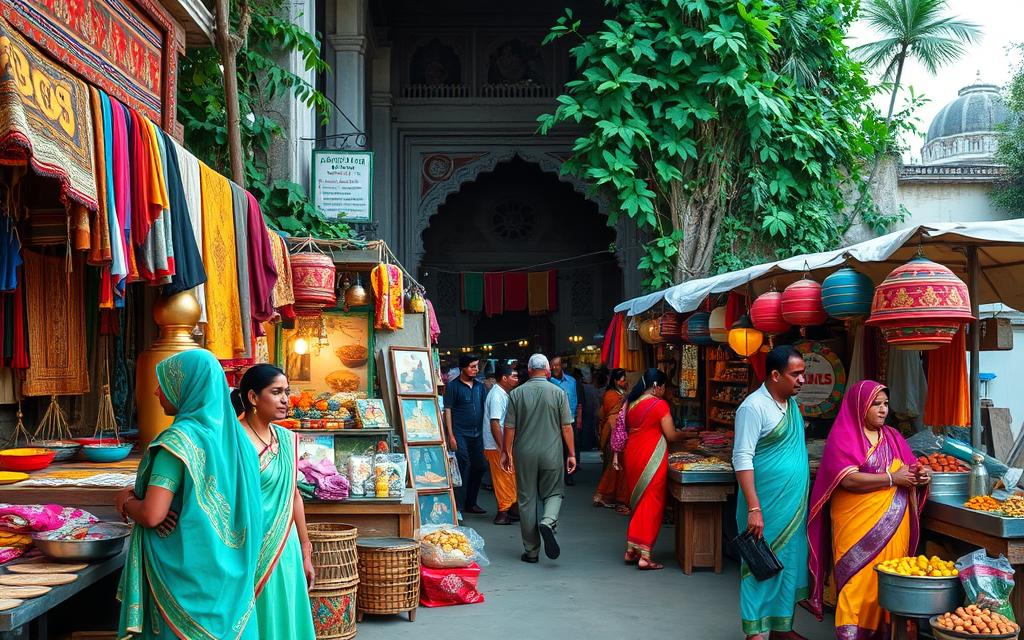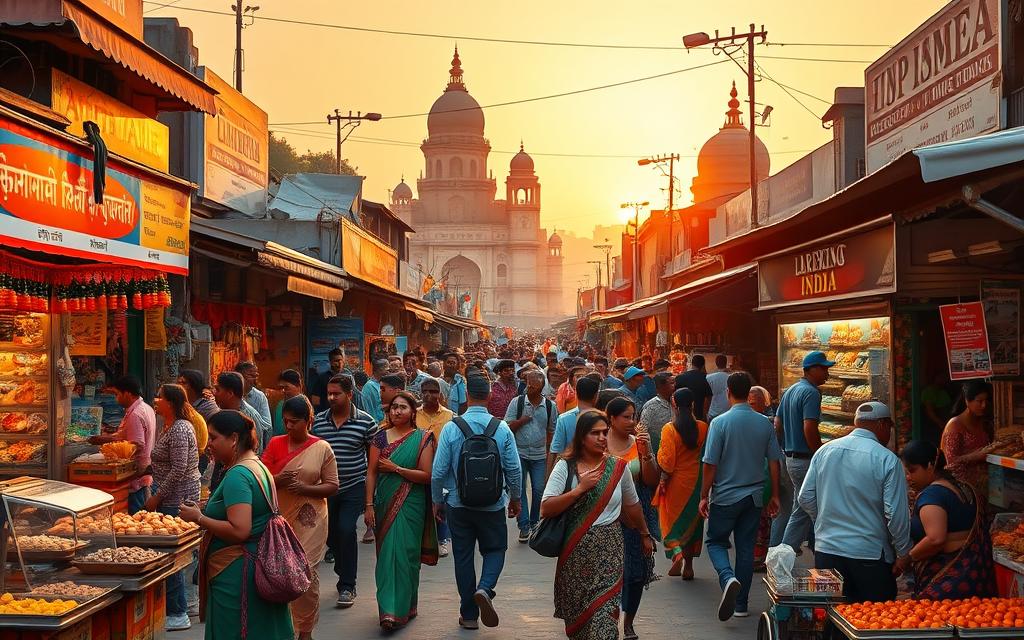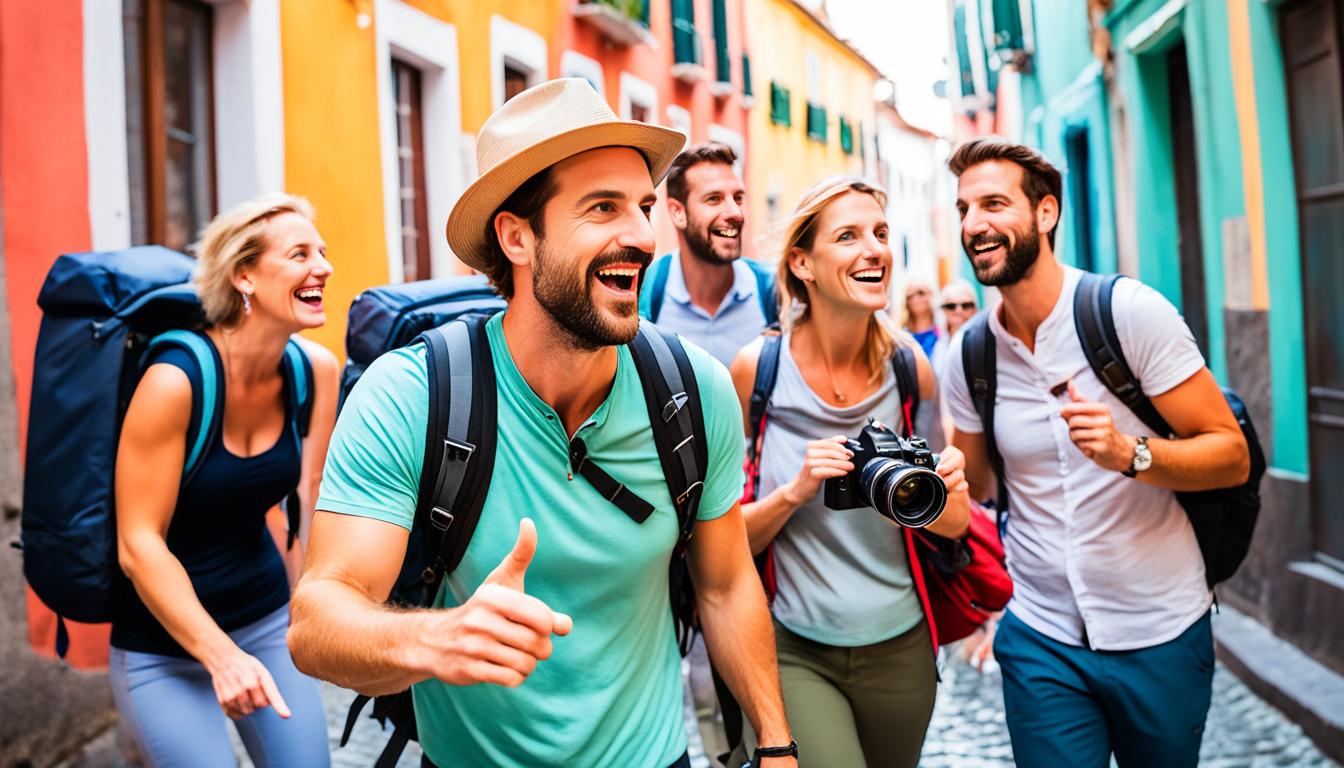India is a vibrant and diverse country unlike any other. It has vast landscapes, rich culture, and historical sites. It can be overwhelming but also fascinating for first-time visitors. Safety varies by area and activities chosen.
Understanding local customs and planning your route are key to safety. Getting travel insurance and staying informed about weather are also important.
Staying alert in crowded places and using safe transport can prevent mishaps. Crimes against tourists are rare, but women may face harassment and pickpocketing. Always use a local SIM card for communication and security.
India’s tourism sector is growing fast, so planning is essential. You can explore historic forts and try the diverse cuisine. India offers many experiences for new tourists, making your journey safe and enjoyable.
Understanding Safety in India for Tourists
India is a fascinating place with a rich culture and lively cities. It’s a great spot for first-time travelers. But, knowing the safety tips is key to a fun and safe trip.

Common Safety Concerns
Travelers in India often face a few safety issues. These include theft, pickpocketing, and scams, especially in busy places like markets. For example, cities like Delhi and Mumbai have fake ticket offices.
Also, watch out for unauthorized donations at religious sites and haggling that might lead to overpaying. Pickpockets are common in crowded areas, so keep an eye on your stuff.
India’s huge population can make public spaces very crowded. There might be demonstrations and strikes that cause trouble. Some areas, like Jammu & Kashmir and Northeastern States, are even more unstable, so extra care is needed.
Tips for Staying Safe
Here are some key safety tips for first-time travelers in India:
- Use cross-body bags to keep thieves away and store valuables in hotel safes or hidden pouches.
- Only take pre-booked or hotel-recommended taxis to avoid scams and high fares.
- Carry hand sanitizer and toilet paper since these are hard to find in public restrooms.
- Always have local emergency numbers and your country’s embassy contact info ready.
- Get a SIM card or eSIM for easy communication and online access.
- Dress modestly, especially at religious sites, to show respect for local customs.
- If you get sick, like “Delhi Belly,” go to local pharmacies for cheap, effective meds.
By following these tips, you can stay safe and enjoy your trip. Also, visiting smaller villages can give you a deeper look into Indian culture.
Areas in India Recommended for First-Time Visitors
If you’re planning your first trip to India, knowing a few key things can make a big difference. Focus on staying safe and finding places that are easy to get around. Here are some of the safest cities and most popular spots to check out.
Top Safe Cities to Explore
India has many cities that are safe, modern, and full of culture. Pune is known for its schools and friendly people. Hyderabad, or the City of Pearls, mixes history with tech, thanks to its IT scene. Chandigarh is a great pick for its clean layout and green areas.
Popular Tourist Destinations
To see India’s history and beauty, you should visit some famous places. The Golden Triangle of Delhi, Jaipur, and Agra is a good start, covering these in about five days. If you have more time, add Udaipur, Jaisalmer, Mumbai, and Goa to see more of India’s variety.
| City/Region | Main Attraction | Safety Rating | Recommended Length of Stay |
|---|---|---|---|
| Pune | Aga Khan Palace | High | 2-3 days |
| Hyderabad | Charminar | High | 2-4 days |
| Chandigarh | Rock Garden | High | 1-2 days |
| Agra | Taj Mahal | Moderate | 1-2 days |
| Jaipur | Amber Fort | Moderate | 2-3 days |
| Kerala | Backwaters | Moderate | 3-5 days |
To make the most of your trip, follow some travel tips for first-time visitors to India. Visit during the off-peak seasons for a better experience. With fewer people, you’ll get more attention and stay safer. Enjoy your journey and dive into India’s rich culture!
Cultural Considerations for Travelers
Visiting India can be a rewarding experience. Knowing a few key things before you go can make your trip even better. The country’s culture is rich and varied, with different customs in each region.
Understanding Local Customs
One important thing to know is the depth of local customs in India. Saying “namaste” with your hands is a common and respectful greeting. India also celebrates many festivals, like Diwali and Eid ul-Fitr, each with its own traditions.

Dress Code and Etiquette
Dressing modestly is important in India’s cities and countryside. Women should cover their legs and shoulders, and men should avoid shorts and sleeveless shirts in conservative areas. It’s also important to remove your shoes before entering homes or temples.
India is very crowded, and personal space is often limited. Respecting local customs helps you move through this environment smoothly. Knowing these tips ensures you can fully enjoy India’s rich diversity.
Health and Safety Precautions
Traveling to India can be thrilling, but it’s vital to take health and safety steps. This ensures a safe trip.
Recommended Vaccinations and Health Tips
Before you go, make sure to get the recommended vaccinations for India. You’ll need hepatitis A and B, typhoid, and polio shots. Also, keep your MMR and diphtheria-tetanus-pertussis vaccinations current.
In places like Meghalaya, Mizoram, and Odisha, where malaria is common, take preventive medicine. Options include ATovaquone/Proguanil, Doxycycline, or Mefloquine.
India has a risk of mosquito-borne diseases. Use insect repellents with at least 20% DEET to protect yourself. Diseases like dengue, Zika, and leishmaniasis spread through mosquito bites. So, it’s crucial to be careful.
For those staying in rural areas, a Japanese Encephalitis vaccine might be a good idea.
Be careful with water and food. Avoid swimming in freshwater to prevent diseases like schistosomiasis and leptospirosis. Wash your hands often, use hand sanitizers with at least 60% alcohol, and don’t touch your face.
Rabies is a concern, especially in remote areas. If bitten by an animal, seek medical help right away. Rabies treatment might not be available everywhere.
How to Handle Emergencies
Being ready for emergencies is key. Know the local emergency number (112 is India’s universal emergency number) and have hospital or clinic contacts handy. Carry your medications and understand your health insurance, especially for medical evacuations.
Motor vehicle crashes are a big risk for travelers. Choose safe transport and stay alert on the roads. Always use trusted rideshare services and be cautious of local traffic.
| Health Concern | Precaution |
|---|---|
| Hepatitis A and B | Get vaccinated |
| Typhoid | Vaccination |
| Malaria | Prophylactic medication |
| Rabies | Seek immediate medical attention if bitten |
| Waterborne Diseases | Avoid swimming in freshwater areas |
Transportation Tips for a Safe Journey
Traveling in India for the first time is exciting. But, safety is key, especially with transportation. Knowing the local transport and being careful can make your trip safer and more fun.
Navigating Public Transport
Public transport in India can be tough but rewarding. The Indian railways are vast and offer a unique experience. For more comfort and safety, book tickets in 2AC or 3AC classes.
Cities like Delhi and Mumbai have safe and efficient metro systems. They are great for city travel. For those on a tight budget, local buses are cheap, with fares starting at 30 to 100 rupees for short trips.
But, be ready for delays and transfers, especially on overnight sleeper buses. They are safer because of sliding doors and other travelers.
Rideshare Options and Tips
Apps like Ola and Uber are safer than street taxis in India. They let you book and track trips online. Always check the driver’s ID and vehicle before getting in, and tell someone you trust where you’re going.
While rideshare services are usually reliable, these precautions can make you even safer.
Being informed and ready can make your travel in India safe and smooth. Remember these tips for a memorable trip in India.
Source Links
- https://www.nomadicmatt.com/travel-blogs/india-travel-tips/
- https://www.lonelyplanet.com/articles/things-to-know-before-traveling-to-india
- https://littleadventurertravels.com/destinations/asia/a-first-timers-guide-to-india/
- https://travelsim.com/26-clever-tips-you-should-know-before-traveling-to-india/
- https://travel.state.gov/content/travel/en/international-travel/International-Travel-Country-Information-Pages/India.html
- https://www.lonelyplanet.com/articles/guide-to-india
- https://beyondthebucketlist.co/a-beginners-guide-to-india-travel-tips-for-first-time-visitors/
- https://soultravelindia.com/culture-shock-in-india/
- https://www.india-briefing.com/news/traveling-india-business-etiquette-culture-6766.html/
- https://wwwnc.cdc.gov/travel/destinations/traveler/none/india
- https://www.fitfortravel.nhs.uk/destinations/asia-east/india
- https://indietravelpodcast.com/india/stay-safe-india/
- https://greatculinarytravels.com/how-to-stay-safe-and-healthy-in-india/
- https://hippie-inheels.com/traveling-india-by-bus/

